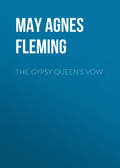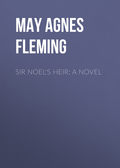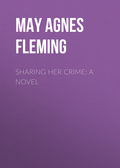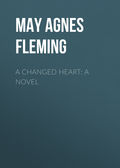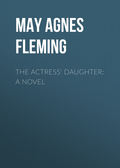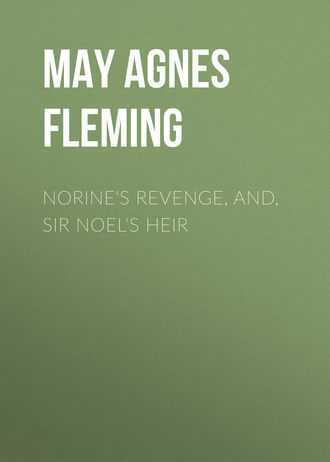
May Agnes Fleming
Norine's Revenge, and, Sir Noel's Heir
CHAPTER X.
ASKING IN MARRIAGE
The fire burned in Lady Thetford's room, and among piles of silken pillows my lady, languid and pale, lay, looking into the leaping flame. It was a warm summer morning, the sun blazed like a wheel of fire in a sky without a cloud, but Lady Thetford was always chilly of late. She drew the crimson shawl she wore closer around her, and glanced impatiently now and then at the pretty toy clock on the decorated chimney-piece. The house was very still; its one disturbing element, Miss Everard, was absent with Sir Rupert for a morning canter over the sunny Devon hills.
The toy clock struck up a gay little waltz preparatory to striking eleven, and my lady turned with a restless, impatient sigh among her pillows.
"How long they stay, and these solitary rides are so dangerous! Oh! what will become of me if it is too late, after all! What shall I do if he says no?"
There was a quick man's step without – a moment, and the door opened, and Sir Rupert, "booted and spurred" from his ride, was bending over his mother.
"Louise says you sent for me after I left. What is it, mother – you are not worse?"
He knelt beside her. Lady Thetford put back the fair, brown hair with tender touch, and gazed in the handsome face, so like her own, with eyes full of unspeakable love.
"My boy! my boy!" she murmured, "my darling Rupert! Oh! it is hard, it is bitter to have to leave you."
"Mother!" with a quick look of alarm, "what is it? Are you worse?"
"No worse, Rupert; but no better. My boy, I shall never be better again in this world."
"Mother – "
"Hush, my Rupert – wait; you know it is true; and but for leaving you I should be glad to go. My life has not been so happy since your father died, Heaven knows, that I should greatly cling to it."
"But, mother, this won't do; these morbid fancies are worst of all. Keeping up one's spirits is half the battle."
"I am not morbid; I merely state a fact – a fact which must preface what is to come. Rupert, I know I am dying, and before we part I want to see my successor at Thetford Towers."
"My dear mother!" amazedly.
"Rupert, I want to see Aileen Jocyln your wife. No, no; don't interrupt me, and believe me, I dislike match-making quite as cordially as you do; but my days on earth are numbered, and I must speak before it is too late. When we were abroad I thought there never would be occasion; when we returned home I thought so, too, Rupert I have ceased to think so since May Everard's return."
The young man's face flushed suddenly and hotly, but he made no reply.
"How any man in his senses could possibly prefer May to Aileen is a mystery I cannot solve; but then these things puzzle the wisest of us at times. Mind, my boy, I don't really say you do prefer May – I should be very unhappy if I thought so. I know – I am certain you love Aileen best; and I am equally certain she is a thousand times better suited to you. Then, as a man of honor, you owe it to her. You have paid Miss Jocyln such attention as no honorable gentleman should pay any lady, except the one he means to make his wife."
Lady Thetford's son rose abruptly, and stood leaning against the mantel, looking steadfastly into the fire.
"Rupert, tell me truly, if May Everard had not come here would you not before this have asked Aileen to be your wife?"
"Yes – no – I don't know. Mother!" the young man cried, impatiently, "what has May Everard done that you should treat her like this?"
"Nothing; I love her dearly, and you know it. But she is not suited to you – she is not the woman you should marry."
Sir Rupert laughed – a hard strident laugh.
"I think Miss Everard is much of your opinion, my lady. You might have spared yourself all these fears and perplexities, for the simple reason that I should have been refused had I asked."
"Rupert!"
"Nay, mother mine, no need to wear that frightened face. I haven't asked Miss Everard in so many words to marry me, and she hasn't declined with thanks; but she would if I did. I saw enough to-day for that."
"Then you don't care for Aileen?" with a look of blank consternation.
"I care for her very much, mother; and I haven't owned to being absolutely in love with our pretty little May. Perhaps I care for one as much as the other; perhaps I know in my inmost heart she is the one I should marry. That is, if she will marry me."
"You owe it to her to ask her."
"Do I? Very likely; and it would make you happy, my mother?"
He came and bent over her again, smiling down in her wan, anxious face.
"More happy than anything else in this world, Rupert."
"Then consider it an accomplished fact. Before the sun sets to-day Aileen Jocyln shall say yes or no to your son."
He bent and kissed her; then, without waiting for her to speak, wheeled round and strode out of the apartment.
"There is nothing like striking while the iron is hot," said the young man to himself with a grim sort of smile as he ran down stairs; "for good or for evil, there is no time like the present, my stately Aileen."
Loitering on the lawn, he encountered May Everard, still in her riding-habit, surrounded by three or four poodle dogs.
"On the wing again, Rupert? Is it for mamma? She is not worse?"
"No; I am going to Jocyln Hall. Perhaps I shall fetch Aileen back."
May's turquoise blue eyes were lifted with a sudden luminous, intelligent flash to his face.
"God speed you! You will certainly fetch Aileen back!"
She held out her hand with a smile that told him she knew all as plainly as he knew it himself.
"You have my best wishes, Rupert, and don't linger; I want to congratulate Aileen."
Sir Rupert's response to these good wishes was very brief and curt. Miss Everard watched him mount and ride off, with a mischievous little smile rippling round her rosy lips.
"My lady has been giving her idol of her existence a caudle lecture – subject, matrimony," mused Miss Everard, sauntering lazily along in the midst of her little dogs, "and really it is high time, if she means to have Aileen for a daughter-in-law; for the heir of Thetford Towers is rather doubtful that he is not falling in love with me; and Aileen is dreadfully jealous and disagreeable; and my lady is anxious, and fidgeted to death about it; and Sir Rupert doesn't want to himself if he can help it. I must be a fascinating little thing, to be sure, and I feel for him, beyond everything; at the same time Beauty," said the young lady, addressing the ugliest of the poodles with a confidential little nod, "they might all spare themselves the trouble of being tormented on the subject; because, you see, my dear little doggy, I wouldn't marry Sir Rupert Thetford if he were heir to the throne of England, much less Thetford Towers. He's a very nice young man, and a very amiable young man, and a very good-looking young man, I have no doubt; but I'm not in love with him, and never shall be; and I'm going to marry for love, or die an old maid. It seems to me a Levantine pirate, or an Italian brigand, or a knight of the road, would suit my ideas; but I suppose there is no use hoping for such fortune as that; but as for Sir Rupert – oh-h-h! good gracious!"
Miss Everard stopped with a shrill, feminine shriek. She had loitered down to the gates, where a young man stood talking to the lodge-keeper, with a big Newfoundland dog gambolling ponderously about him. The big Newfoundland made an instant dash into Miss Everard's guard of honor, with one deep, bass bark, like distant thunder, and which effectually drowned the yelps of the poodles. May flew to the rescue, seizing the Newfoundland's collar, and pulling him back with all the might of two little white hands.
"You great, horrid brute!" cried May, with flashing eyes, "how dare you! Call-off your dog, sir, this instant! Don't you see how he is frightening mine!"
She turned imperiously to the Newfoundland's master, the bright eyes flashing, the pink cheeks aflame – very pretty, indeed, in her wrath.
"Down, Hector!" called the young man, authoritatively; and Hector, like the well-trained animal he was, subsided instantly. "I beg your pardon, young lady! Hector, you stir at your peril, sir! I am very sorry he has alarmed you."
He doffed his cap with careless grace, and made the angry little lady a courtly bow.
"He didn't alarm me," replied May, testily; "he only alarmed my dogs. Why, dear me! how very odd!"
Miss Everard, looking full at the young man, had started back with this exclamation, and stared broadly. A tall, powerful looking young fellow, rather dusty and travel-stained, but eminently gentlemanly, with frank, blue eyes, and profuse fair hair, and a handsome, candid face.
"Yes, Miss May," struck in the lodge-keeper, "it is odd! I see it, too! He looks enough like Sir Noel, dead and gone, to be his own son!"
"I beg your pardon," said May, becoming conscious of her wide stare, "but is your name Legard; and are you a friend of Sir Rupert Thetford?"
"Yes, to both questions," with a smile that May liked. "You see the resemblance too, then. Sir Rupert used to speak of it. Is he at home?"
"Not just now; but he will be very soon, and I know will be glad to see Mr. Legard. You had better come and wait."
"And Hector," said Mr. Legard. "I think I had better leave him behind, as I see him eyeing your guard of honor with anything but a friendly eye. I believe I have the pleasure of addressing Miss Everard? Oh!" laughing frankly at her surprised face, "Sir Rupert showed me a photograph of yours as a child. I have a good memory for faces, and knew you at once."
Miss Everard and Mr. Legard fell easily into conversation at once, as if they had been old friends. Lady Thetford's ward was one of those people who form their likes and dislikes at first sight; and Mr. Legard's face would have been a pretty sure letter of recommendation to him the wide world over. May liked his looks; and then he was Sir Rupert's friend, and she was never particular about social forms and customs; and so they dawdled about the grounds, and through the leafy arcades, in the genial morning sunshine, talking about Sir Rupert and Rome, and art and artists, and the thousand and one things that turn up in conversation; and the moments slipped by, half hour followed half hour, until May jerked out her watch at last in a sudden fit of recollection, and found, to her consternation, it was past two.
"What will mamma say!" cried the young lady, aghast. "And Rupert; I dare say he's home to luncheon before this. Let us go back to the house, Mr. Legard. I had no idea it was half so late."
Mr. Legard laughed frankly.
"The honesty of that speech is the highest flattery my conversational powers ever received, Miss Everard. I am very much obliged to you. Ah! by Jove! Sir Rupert himself."
For riding slowly up under the sunlit trees, came the young baronet. As Mr. Legard spoke, his glance fell upon them, the young lady and gentleman advancing so confidentially, with half a dozen curly poodles frisking around them. To say Sir Rupert stared, would be a mild way of putting it – his eyes opened in wide wonder.
"Guy Legard!"
"Thetford! My dear Sir Rupert!"
The baronet leaped off his horse, his eyes lighting, and shook hands with the artist, in a burst of heartiness very rare with him.
"Where in the world did you drop from, and how under the sun do you come to be on such uncommonly friendly footing with Miss Everard?"
"I leave the explanation to Mr. Legard," said May, blushing a little under Sir Rupert's glance, "while I go and see mamma, only premising that luncheon-hour is past, and you had better not linger."
She tripped away, and the two young men followed more slowly into the house. Sir Rupert led his friend to his studio, and left him to inspect the pictures.
"Whilst I speak a word to my mother," he said; "it will detain me hardly an instant."
"All right!" said Mr. Legard, boyishly. "Don't hurry yourself on my account, you know."
Lady Thetford lay where her son had left her; lay as if she had hardly stirred since. She looked up, and half rose as he came in, her eyes painfully, intensely anxious. But his face, grave and quiet, told nothing.
"Well," she panted, her eyes glittering.
"It is well, mother. Aileen Jocyln has promised to become my wife."
"Thank God!"
Lady Thetford sunk back, her hands clasped tightly over her heart, its loud beating plainly audible. Her son looked down at her, his face keeping its steady gravity – none of the rapture of an accepted lover there.
"You are content, mother?"
"More than content, Rupert. And you?"
He smiled, and stooping, kissed the worn, pallid face. "I would do a great deal to make you happy, mother; but I would not ask a woman I did not love to be my wife. Be at rest; all is well with me. And now I must leave you, if you will not go down to luncheon."
"I think not; I am not strong to-day. Is May waiting?"
"More than May. A friend of mine has arrived, and will stay with us for a few weeks."
Lady Thetford's face had been flushed and eager, but at the last words it suddenly blanched.
"A friend, Rupert! Who?"
"You have heard me speak of him before," he said, carelessly; "his name is Guy Legard."
CHAPTER XI.
ON THE WEDDING EVE
The family at Thetford Towers were a good deal surprised, a few hours later that day, by the unexpected appearance of Lady Thetford at dinner. Wan as some spirit of the moonlight, she came softly in, just as they entered the dining-room; and her son presented his friend, Mr. Legard, at once.
"His resemblance to the family will be the surest passport to your favor, mother mine," Sir Rupert said, gayly. "Mrs. Weymore met him just now, and recoiled with a shriek, as though she had seen a ghost. Extraordinary, isn't it – this chance resemblance?"
"Extraordinary," Lady Thetford said, "but not at all unusual. Of course, Mr. Legard is not even remotely connected with the Thetford family?"
She asked the question without looking at him. She kept her eyes fixed on her plate, for that fair face before her was terrible to her almost as a ghost. It was the days of her youth over again, and Sir Noel, her husband, once more by her side.
"Not that I am aware of," Mr. Legard said, running his fingers through his abundant blonde hair. "But I may be, for all that. I am like the hero of a novel – a mysterious orphan – only, unfortunately, with no identifying strawberry-mark on my arm. Who my parents were, or what my real name is, I know no more than I do of the biography of the man in the moon."
There was a murmur of astonishment – May and Rupert vividly interested, Lady Thetford white as a dead woman, her eyes averted, her hand trembling as if palsied.
"No," said Mr. Legard, gravely, and a little sadly, "I stand as totally alone in this world as a human being can stand – father, mother, brother, sister, I never have known; a nameless penniless waif, I was cast upon the world four-and-twenty years ago. Until the age of twelve I was called Guy Vyking; then the friends with whom I had lived left England for America, and a man, a painter, named Legard, took me, and gave me his name. And there the romance comes in; a lady, a tall, elegant lady, too closely veiled for us to see her face, came to the poor home that was mine, paid those who kept me from my infancy, and paid Legard for his future care of me. I have never seen her since; and I sometimes think," his voice failing, "that she may have been my mother."
There was a sudden clash, and a momentary confusion. My lady, lifting her glass with that shaking hand, had let it fall, and it was shivered to atoms on the floor.
"And you never saw the lady after?" May asked.
"Never. Legard received regular remittances, mailed, oddly enough, from your town here – Plymouth. The lady told him, if he ever had occasion to address her, which he never did have, that I know of, to address Madam Ada, Plymouth! He brought me up, educated me, taught me his art, and died. I was old enough then to comprehend my position; and the first use I made of that knowledge, was to return 'Madam Ada' her remittances, with a few sharp lines, that effectually put an end to them."
"Have you ever tried to ferret out the mystery of your birth, and this Madam Ada?" inquired Sir Rupert.
Mr. Legard shook his head.
"No, why should I? I dare say I should have no reason to be proud of my parents if I did find them; and they evidently were not very proud of me. 'Where ignorance is bliss,' etc. If destiny has decreed it, I shall know, sooner or later; if destiny has not, then my puny efforts will be of no avail. But if presentiments mean anything, I shall one day know; and I have no doubt, if I searched Devonshire, I should find Madam Ada."
May Everard started up with a cry, for Lady Thetford had fallen back in one of those sudden spasms to which she had lately become subject. In the universal consternation, Guy Legard and his story were forgotten.
"I hope what I said had nothing to do with this," he cried aghast; and the one following so suddenly upon the other made the remark natural enough. But Sir Rupert turned upon him in haughty surprise.
"What you said! My mother, unfortunately, has been subject to these attacks for the past two years, Mr. Legard. That will do, May; let me assist my mother to her room."
May drew back. Lady Thetford was able to rise, pallid and trembling, and, supported by her son's arm, to walk from the room.
"Lady Thetford's health is very delicate, I fear," Mr. Legard murmured, sympathetically. "I really thought for a moment my story-telling had occasioned her sudden illness."
Miss Everard fixed a pair of big, shining eyes in solemn scrutiny on his face – that face so like the pictured one of Sir Noel Thetford.
"A very natural supposition," thought the young lady; "so did I."
"You never knew Sir Noel?" Guy Legard said, musingly; "but, of course, you did not. Sir Rupert has told me he died before he was born."
"I never saw him," said May; "but those who have seen him in this house, our housekeeper, for instance, stands perfectly petrified at your extraordinary likeness to him. Mrs. Hilliard says you have given her a 'turn' she never expects to get over."
Mr. Legard smiled, but was very grave again directly.
"It is odd – odd – very odd!"
"Yes," said May Everard, with a sagacious nod; "a great deal, too, to be a chance resemblance. Hush! here comes Rupert. Well, how have you left mamma?"
"Better; Louise is with her. And now to finish dinner; I have an engagement for the evening."
Sir Rupert was strangely silent and distrait all through dinner, a darkly thoughtful shadow glooming his ever pale face. A supposition had flashed across his mind that turned him hot and cold by turns – a supposition that was almost a certainty. This striking resemblance of the painter, Legard, to his dead father was no freak of nature, but a retributive Providence revealing the truth of his birth. It came back to his memory with painfully acute clearness, that his mother had sunk down once before in a violent tremor and faintness at the mere sound of his name. Legard had spoken of a veiled lady – Madam Ada, Plymouth, her address. Could his mother – his – be that mysterious arbiter of Legard's fate? The name – the place. Sir Rupert Thetford wrenched his thoughts by a violent effort away, shocked and horrified at himself.
"It cannot be – it cannot?" he said to himself passionately; "I am mad to harbor such thoughts. It is a desecration of the memory of the dead, a treason to the living. But I wish Guy Legard had never come here."
There was one other person at Thetford Towers strangely and strongly effected by Mr. Guy Legard; and that person, oddly enough, was Mrs. Weymore, the governess. Mrs. Weymore had never even seen the late Sir Noel that any one knew of, and yet she had recoiled with a shrill, feminine cry of utter consternation at sight of the young man.
"I don't see why you should get the fidgets about it, Mrs. Weymore," Miss Everard remarked, with her great, bright eyes suspiciously keen, "you never knew Sir Noel."
Mrs. Weymore sunk down on a lounge quite white and startled.
"My dear, I beg your pardon. I – it seems strange. O May!" with a sudden sharp cry, losing self-control, "who is that young man?"
"Why, Mr. Guy Legard, artist," answered May, composedly, the bright eyes still on the alert; "formerly in 'boyhood's sunny hours,' you know, Master Guy – let me see! Yes, Vyking."
"Vyking!" repeated Mrs. Weymore with a spasmodic cry; and then dropped her white face in her hands, trembling from head to foot.
"Well, upon my word," Miss Everard said, addressing empty space, "this does cap the globe! The Mysteries of Udolpho were plain reading compared to Mr. Guy Vyking, and the effect he produces on people. He's a very handsome young man, and a very agreeable young man; but I should never have suspected he possessed the power of throwing all the elderly ladies he meets into gasping fits. There's Lady Thetford, he was too much for her, and she had to be helped out of the dining-room; and here's Mrs. Weymore going into hysterics because he used to be called Guy Vyking. I thought my lady might be the veiled lady of his story; but now I think it must have been Mrs. Weymore."
Mrs. Weymore looked up, her very lips white as ashes.
"The veiled lady? What lady? May, tell me all you know of Mr. Vyking."
"Not Vyking now – Legard," answered May; and thereupon the young lady detailed the scanty résumé the artist had given them of his history.
"And I'm very sure it isn't chance at all," concluded May Everard, transfixing the governess with an unwinking stare; "and Mr. Legard is as much a Thetford as Sir Rupert himself. I don't pretend to divination, of course, and I don't clearly see how it is; but it is, Mrs. Weymore; and you could enlighten the young man, and so could my lady, if either of you chose."
Mrs. Weymore turned suddenly and caught May's two hands in hers.
"May, if you care for me, if you have any pity, don't speak of this, I do know – but I must have time. My head is in a whirl. Wait, wait, and don't tell Mr. Legard."
"I won't," said May; "but it's all very strange and very mysterious, delightfully like a three-volume novel, or a sensation play. I'm getting very much interested in the hero of the performance; and I'm afraid I shall be deplorably in love with him shortly, if this sort of thing keeps on."
Mr. Legard, himself, took the matter much more coolly than any one else; smoked cigars philosophically; criticised Sir Rupert's pictures – did a little that way himself; played billiards with his host; and chess with Miss Everard, rode with that young lady, walked with her, sang duets with her, in a deep melodious bass; made himself fascinating, and took the world easy.
"It is no use getting into a gale about these things," he said to Miss Everard, when she wondered aloud at his constitutional phlegm; "the crooked things will straighten of themselves if we give them time. What is written is written. I know that I shall find out all about myself one day – like little Paul Dombey, 'I feel it in my bones.'"
Mr. Legard was thrown a good deal upon Miss Everard's resources for amusement; for, of course, Sir Rupert's time was chiefly spent at Jocyln Hall, and Mr. Legard bore this with even greater serenity than the other. Miss Everard was a very charming little girl, with a laugh that was sweeter than the music of the spheres, and hundreds of bewitching little ways; and Mr. Legard undertook to paint her portrait, and found it the most absorbing work of art he had ever undertaken. As for the young baronet, spending his time at Jocyln Hall, they never missed him. His wooing sped on smoothest wings – Colonel Jocyln almost as much pleased as my lady herself; and the course of true love in this case ran as smooth as heart could wish.
Miss Jocyln, as a matter or course, was a great deal at Thetford Towers, and saw with evident gratification the growing intimacy of Mr. Legard and May. It would be an eminently suitable match, Miss Jocyln thought, only it was a pity so much mystery shrouded the gentleman's birth. Still he was a gentleman, and with his talents, no doubt, would become an eminent artist; and it would be highly satisfactory to see May fix her erratic affections on somebody and thus be doubly out of her (Miss Jocyln's) way.
The wedding preparations were going briskly forward. There was no need of delay, all were anxious for the marriage – Lady Thetford more than anxious, on account of her declining health. The hurry to have the ceremony irrevocably over had grown to be something very like monomania with her.
"I feel that my days are numbered," she said, with feverish impatience, to her son, "and I cannot rest in my grave, Rupert, until I see Aileen your wife."
So Sir Rupert, more than anxious to please his mother, hastened on the wedding. An eminent physician, summoned down from London, confirmed my lady's own fears.
"Her life hangs by a thread," this gentleman said, confidentially, to Sir Rupert; "the slightest excitement may snap it at any moment. Don't contradict her – let everything be as she wishes. Nothing can save her, but perfect quiet and repose may prolong her existence."
The last week of September the wedding was to take place; and all was bustle and haste at Jocyln Hall. Mr. Legard was to stay for the wedding, at the express desire of Lady Thetford herself. She had seen him but very rarely since that first day; illness had compelled her to keep her room; but her interest in him was unabated, and she had sent for him to her apartment, and invited him to remain. And Mr. Legard, a good deal surprised, and a little flattered, consented at once.
"Very kind of Lady Thetford, you know, Miss Everard," Mr. Legard said, sauntering into the room where she sat with her ex-governess – Mr. Legard and Miss Everard were growing highly confidential of late – "to take such an interest in an utter stranger as she does in me."
May stole a glance from under her eyelashes at Mrs. Weymore; that lady sat nervous and scared-looking, and altogether uncomfortable, as she had a habit of doing in the young artist's presence.
"Very," Miss Everard said, dryly. "You ought to feel highly complimented, Mr. Legard, for it's a sort of kindness her ladyship is extremely chary of to utter strangers. Rather odd, isn't it, Mrs. Weymore?"
Mrs. Weymore's reply was a distressed, beseeching look. Mr. Legard saw it, and opened very wide his handsome, Saxon eyes.
"Eh?" he said, "it doesn't mean anything does it? Mrs. Weymore looks mysterious, and I'm so stupid about these things. Lady Thetford doesn't know anything about me, does she?"
"Not that I know of," May said, with significant emphasis on the personal pronoun.
"Then Mrs. Weymore does! By Jove! I always thought Mrs. Weymore had an odd way of looking at me! And now, what is it?"
He turned his fair, resolute face to that lady with a smile hard to resist.
"I don't make much of a howling about my affairs, you know, Mrs Weymore," he said; "but, for all that, I am none the less interested in myself and history. If you can open the mysteries a little you will be conferring a favor on me I can never repay. And I am positive from your looks you can."
Mrs. Weymore turned away, and covered her face, with a sort of sob. The young lady and gentleman exchanged startled glances.
"You can then?" Mr. Legard said, gravely, but growing very pale. "You know who I am?"
To his boundless consternation Mrs. Weymore rose up, seizing his hands and covering them with kisses.
"I do! I do! I know who you are, and so shall you before this wedding takes place. But before I tell you I must speak to Lady Thetford."
Mr. Legard withdrew his hands, his face as colorless as her own.
"To Lady Thetford! What has Lady Thetford to do with me?"
"Everything! She knows who you are as well as I do. I must speak to her first."
"Answer me one thing – is my name Vyking?"
"No. Pray, pray don't ask me any more questions. As soon as her ladyship is a little stronger, I will go to her and obtain her permission to speak. Keep what I have said a secret from Sir Rupert, and wait until then."
She turned to go, so haggard and wild-looking, that neither strove to detain her. The young man stared blankly after her as she left the room.
"At last!" he said, drawing a deep breath, "at last I shall know!"
There was a pause; then May spoke in a fluttering little voice.
"How very strange that Mrs. Weymore should know, of all persons in the world!"
"Who is Mrs. Weymore? How long has she been here? Tell me all you know of her, Miss Everard."
"And that 'all' will be almost nothing. She came down from London as nursery-governess to Rupert and me, a week or two after my arrival here, selected by the rector of St. Gosport. She was then what you see her now, a pale, subdued creature in widow weeds, with the look of one who had seen trouble. I have known her so long, and always as such a white, still shadow, I suppose that is why it seems so odd."
Mrs. Weymore kept altogether out of Mr. Legard's way for the next week or two. She avoided May also, as much as possible, and shrunk so palpably from any allusion to the past scene, that May good-naturedly bided her time in silence, though almost as impatient as Mr. Legard himself.
And whilst they waited the bridal-eve came round, and Lady Thetford was much better, not able to quit her room, but strong enough to lie on a sofa and talk to her son and Colonel Jocyln, with a flush on her cheek, and a sparkle in her eye – all unusual there.
The marriage was to take place in the village church, and there was to follow a grand ceremonial wedding-breakfast; and then the happy pair were to start at once on their blissful bridal-tour.
"And I hope to see my boy return," Lady Thetford said, kissing him fondly. "I can hardly ask for more than that."
Late in the afternoon of that eventful wedding-eve, the ex-governess sought out Guy Legard, for the first time of her own accord. She found him in the young baronet's studio, with May, putting the finishing touches to that young lady's portrait. He started up at sight of his visitor, vividly interested. Mrs. Weymore was paler even than usual, but with a look of deep, quiet determination on her face no one had ever seen there before.



